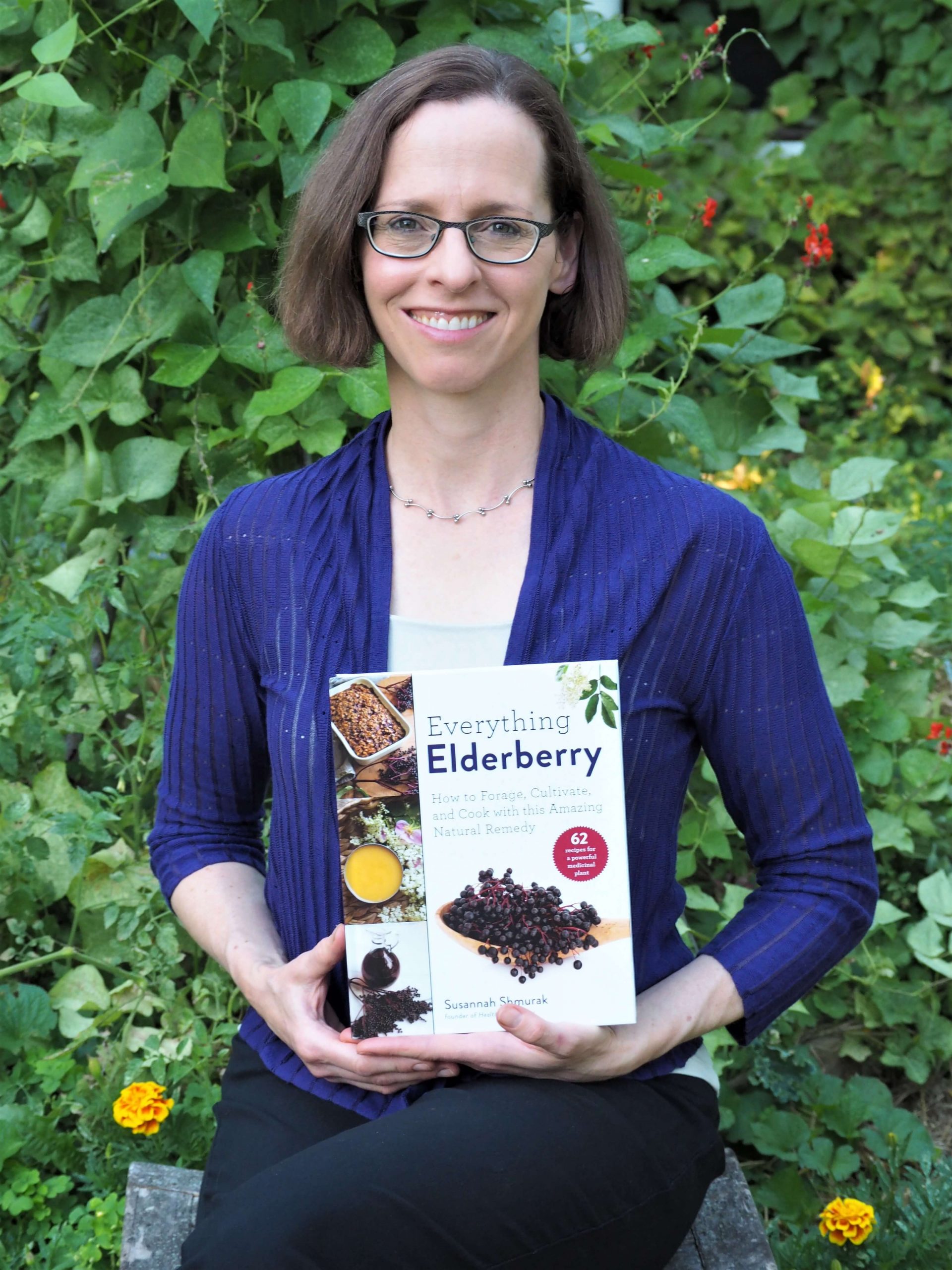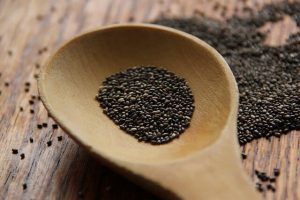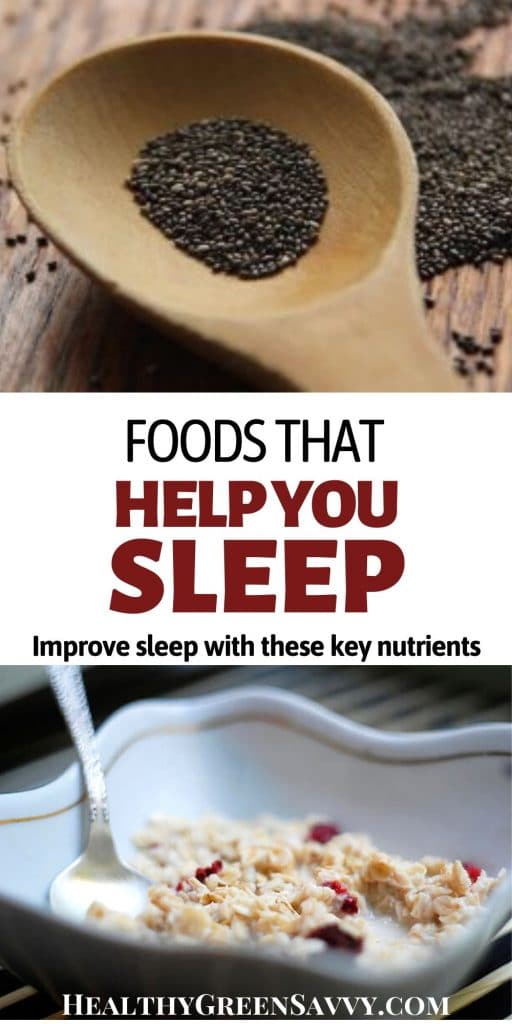Last Updated on February 28, 2025
Have trouble sleeping? You’re not alone. More than half of Americans report regularly having poor sleep. Could your diet do more to help you get some quality ZZZs? Here are the top foods that help you sleep.
Not sleeping well is not only incredibly frustrating, but it’s also really rough on your health. In addition to affecting your brain function and upping your risk of obesity, lack of sleep wreaks havoc on your immune system. The CDC has called insufficient sleep “a public health problem.”
Did you know you’re far more likely to get sick when you miss a night’s sleep? Plus it makes me you just plain grumpy and less able to cope with the stresses of daily life.
Before you turn to sleeping pills or OTC sleep medications, try some of these sleep-inducing diet fixes and natural remedies to see if they help your problem. Foods that support better sleep may be just what your body needed to get better slumber.
Better Sleep 101: How’s Your Sleep Hygiene?
The first step to fixing a sleep problem is evaluating whether you have what experts call good sleep hygiene, which means you’re following a regular schedule, powering down, cutting back on caffeine, limiting light exposure in the bedroom, as well as some other behavioral factors that can significantly influence how well you sleep. A lot has been written on this in the last few years. Here’s a good overview from Harvard.
Also make sure your mattress is comfortable. If aches and pains are waking you frequently, you’re going to be tired and not functioning at your best. Replace your mattress if it’s not working for you, and do your health a favor: choose a nontoxic mattress made from latex, wool, or organic cotton that’s not treated with chemical fire retardants.
You spend a third of your life in bed, and you don’t need to bombard yourself with toxic chemicals while you’re trying to get restorative sleep. Buyer beware: Most mattresses are made with chemicals that have no place in your healthy home! Here’s the lowdown on finding a non-toxic mattress, and here are the 3 best organic mattresses on the market to consider.
If you want a healthy, comfortable, and affordable mattress, you have got to check out the MADE SAFE, GOTS & GOLS certified mattresses from Happsy and Avocado!
(If replacing your mattress isn’t an option right now, you could try a latex topper to make your existing mattress more comfortable.)
So your sleep hygiene’s good and your mattress is comfortable, but you’re still sleeping poorly? Here are some diet hacks that can help support your body’s ability to get restorative sleep.
What to Eat for Better Sleep
A number of nutrients are involved in the production of serotonin and melatonin, both of which play a role in our sleep. If you wake frequently or have trouble falling asleep, you might experiment with some dietary changes more likely to support restful slumber. Some of the key nutrients to look out for:
- Magnesium
- Calcium
- B-6
- Potassium
Getting enough of these nutrients over the course of the day may help your body do a better job producing its sleep regulators. A whole-foods diet rich in vegetables will go a long way toward addressing deficiencies.
See my post on magnesium for a list of magnesium-rich foods. Many of these foods are also good sources of potassium, including bananas, avocados, soybeans and yogurt. Vitamin B-6 can be found in fish, bananas, and chickpeas, among many other foods. Getting enough calcium through dairy or other sources (dark leafy greens, almonds, and tofu, for example) should also help support sleep quality.
This banana tea for sleep uses banana peels and nutmeg to make a tasty before-bed drink with extra sleep-supporting compounds.
Vitamin D also seems to play a role in sleep, so getting enough through sun exposure or supplements may also help you sleep better.
Related: Health Benefits of Potassium & Best Sources of Potassium
Sleep-Promoting Bedtime Snacks
What you nosh before bed could help you sleep better. Experts recommend a light snack before bedtime that combines carbohydrates and proteins as well as some of the nutrients linked to better sleep. A heavy meal can interfere with sleep, as can hunger, so a light snack makes the most sense, a couple hours before bed.
You can make your bedtime snack work for better sleep by combining some of the foods highest in sleep-promoting nutrients. If you picked banana as a smart choice, you get full marks.
Some other foods that help you sleep to consider incorporating at bedtime:
-
- Tart cherries or cherry juice, which contain naturally-occurring melatonin. Studies have shown improved sleep with consumption of tart cherry juice.
- Walnuts, which contain melatonin as well as tryptophan, a precursor to serotonin and melatonin.
- Oatmeal, which in addition to magnesium and potassium, also contains melatonin. (This is a great deal on organic steel cut oats — check it out!)
- Almonds or almond milk, containing magnesium and potassium, as well as some calcium.
- Chia seeds, a good source of magnesium, calcium, and potassium. (Best deal I’ve found on chia here.)
- Pumpkin seeds, a rich source of magnesium and a good source of potassium.
- Kiwis, which in a small study seemed to significantly improved sleep quality and quantity.
- Chamomile or lemon balm tea to help you relax before bed. When I don’t have time to steep fresh-picked or dried lemon balm (my sleep herb of choice) ahead of time, I really like Tulsi Sleep tea. It tastes good and seems to help my sleep quality. Tulsi, or holy basil, is one of those adaptogenic herbs thought to help calm nerves, just what you want after a hectic day! I’ve also recently found this tea with lemon balm, chamomile, and lavender, which is great when I travel and don’t have my lemon balm along.
So if you’ve got the munchies after dinner, maybe consider some of these sleep-promoting snacks. Or combine them for even more sleep-supporting compounds!
Some options for foods that help you sleep:
- Yogurt smoothie with banana, chia, or almond butter
- Oatmeal with walnuts and banana or dried cherries
- Chia pudding with almonds and cherries, kiwi, or banana. (Not into the whole chia pudding fad? Try adding a little chia to your oatmeal instead.)
If your snack needs a sweetener, you might throw in a tablespoon of molasses for added magnesium and potassium.
Aromatherapy can also help you relax if you’re having trouble sleeping. (Check out this post on how to use essential oils for beginners ) Try a few drops of lavender oil on your pillow, or keep a small bowl or vase of dried lavender on your bedside table. You could also try a little of this calming balm on your temples.
If you want to dive in more deeply to using essential oils for sleep, check out this post from the Hippy Homemaker, my go-to resource on oils and herbs. You could also try her herbal tea blend.
If you try some of these remedies, leave a comment to let me know if you’re sleeping better! What foods that help you sleep do you like best?
Pin these foods that help you sleep to save for later!
Photo credits: Rachel Hathaway, Dmitry Kugarov, torbakhopper, thebittenword.com, Mumumío via Flickr

Susannah is a proud garden geek and energy nerd who loves healthy food and natural remedies. Her work has appeared in Mother Earth Living, Ensia, Northern Gardener, Sierra, and on numerous websites. Her first book, Everything Elderberry, released in September 2020 and has been a #1 new release in holistic medicine, naturopathy, herb gardening, and other categories. Find out more and grab your copy here.








 Hi, I'm Susannah, a garden geek, energy nerd, and fan of healthy food and natural remedies. Need some simple, practical solutions for living healthier and greener? You've come to the right place! More about me and my green projects
Hi, I'm Susannah, a garden geek, energy nerd, and fan of healthy food and natural remedies. Need some simple, practical solutions for living healthier and greener? You've come to the right place! More about me and my green projects